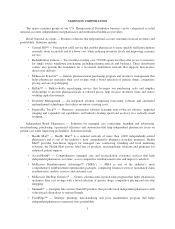McKesson 2016 Annual Report Download - page 21
Download and view the complete annual report
Please find page 21 of the 2016 McKesson annual report below. You can navigate through the pages in the report by either clicking on the pages listed below, or by using the keyword search tool below to find specific information within the annual report.McKESSON CORPORATION
effective for services provided on or after April 1, 2013. This automatic reduction is known as “sequestration.”
Medicare generally reimburses physicians for Part B drugs at the rate of average sales price (“ASP”) plus 6%.
The implementation of sequestration pursuant to the Budget Control Act of 2011 has effectively reduced
reimbursement below the ASP plus 6% level for the duration of sequestration (which lasts through fiscal 2024 in
the absence of additional legislation). As another example, the Medicare Access and CHIP Reauthorization Act
(“MACRA”), signed into law in April 2015, seeks to reform Medicare reimbursement policy for physician fee
schedule services and adopts a series of policy changes affecting a wide range of providers and suppliers. Most
notably, MACRA repeals the statutory Sustainable Growth Rate formula, which has called for cuts in Medicare
rates in recent years, but which Congress routinely stepped in to override the full application of the formula.
Instead, after a period of stable payment updates, MACRA links physician payment updates to quality and value
measurements and participation in alternative payment models. MACRA also extends certain expiring Medicare
and other health policy provisions, including extending the Children’s Health Insurance Program. Additionally,
concerns held by federal policymakers about the federal deficit and national debt levels could result in enactment
of further federal spending reductions, further entitlement reform legislation affecting the Medicare program, or
both. We cannot predict what alternative or additional deficit reduction initiatives or Medicare payment
reductions, if any, will ultimately be enacted into law, or the timing or affect any such initiatives or reductions
will have on us.
There can be no assurance that the preceding changes would not have a material adverse impact on our
results of operations.
Operating, Security and Licensure Standards: We are subject to the operating and security standards of the
Drug Enforcement Administration (“DEA”), the U.S. Food and Drug Administration (“FDA”), various state
boards of pharmacy, state health departments, the U.S. Department of Health and Human Services (“HHS”), the
CMS and other comparable agencies. Certain of our businesses may be required to register for permits and/or
licenses with, and comply with operating and security standards of, the DEA, FDA, HHS, CMS, various state
boards of pharmacy, state health departments and/or comparable state agencies as well as foreign agencies and
certain accrediting bodies, depending upon the type of operations and location of product development,
manufacture, distribution, and sale. For example, we are required to hold valid DEA and state-level registrations
and licenses, meet various security and operating standards and comply with the Controlled Substances Act and
its accompanying regulations governing the sale, marketing, packaging, holding, distribution, and disposal of
controlled substances.
As part of these operating, security and licensure standards, we regularly receive requests for information
and occasionally subpoenas from government authorities. In some instances, these can lead to monetary penalties
and/or license revocation. In March 2015, we reached an agreement in principle with the DEA and Department of
Justice pursuant to which we agreed to pay the sum of $150 million to settle all potential administrative and civil
claims relating to investigations about the Company’s suspicious order reporting practices for controlled
substances.
Although we have enhanced our procedures to ensure compliance, there can be no assurance that a
regulatory agency or tribunal would conclude that our operations are compliant with applicable laws and
regulations. In addition, there can be no assurance that we will be able to maintain or renew existing permits,
licenses or any other regulatory approvals or obtain without significant delay future permits, licenses or other
approvals needed for the operation of our businesses. Any noncompliance by us with applicable laws and
regulations or the failure to maintain, renew or obtain necessary permits and licenses could lead to litigation and
have a material adverse impact on our results of operations.
Pedigree Tracking: There have been increasing efforts by Congress and state and federal agencies,
including state boards of pharmacy and departments of health and the FDA, to regulate the pharmaceutical
15
























